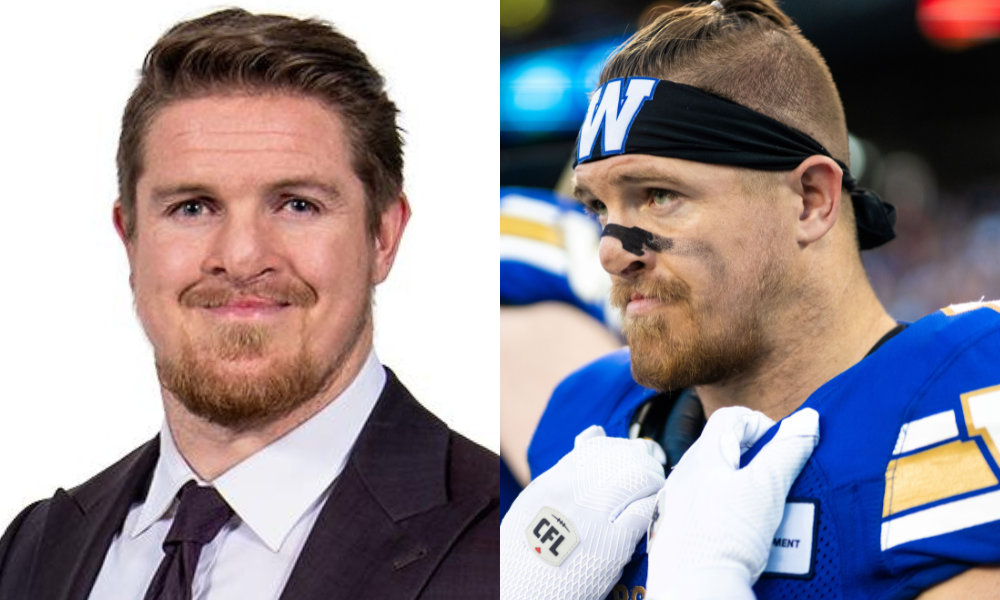Blue Bombers linebacker and Wellington-Altus advisor explains why athletes need advisors and how he has been able to reach this niche client base

Adam Bighill is already living his life after football. The linebacker for the Winnipeg Blue Bombers of the CFL is a three-time Grey Cup winner, a six-time CFL All-Star and a three-time winner of the CFL’s Most Outstanding Defensive Player Award. He has excelled in a physically and mentally demanding sport for almost fifteen years, far longer than the average pro football career. He’s done it all while becoming a financial advisor.
In addition to his role with the Blue Bombers, Bighill is an investment advisor with Pejovic Bighill Private Wealth of Wellington-Altus Private Wealth. Working on a team alongside two former CFL pros, Bighill serves a number of professional athlete clients. He outlined why pro sports players need financial advice as early in their careers as possible. He explained how he approaches these clients from an investment and a behavioural standpoint and how his career in football has given him a unique advantage as an advisor.
“It comes down to a unique understanding,” Bighill says. “I know what it’s like day to day. From their game, to their workout, rundown, film, recovery, treatment, and then the same again, travel, and another game. There are cycles that athletes live with that you have to understand because they’re so different to anything else. We understand what they go through in a job that’s mentally, physically, and emotionally very challenging. I can connect with athletes on a unique level and understand what they’re going through.”
As an advisor, Bighill is uniquely equipped to answer his clients’ core question of what they will do after they retire from pro sports. Bighill’s own answer to that question was his career in financial advice. It’s something he thought about since his first seasons in the CFL with the BC Lions. He met a few friends with connections to the industry and he began his licensing exams while playing. While playing for the Blue Bombers he spoke to a few firm leaders, most of whom offered him a role after he retired from the CFL. Charlie Spiring, the Founder & Chair of Wellington-Altus, told Bighill that so long as he was successful, he could work as an advisor for Wellington-Altus while he continued to play.
It's taken a lot of 5am starts for Bighill to get where he is today. He is quick to attribute much of that success to the support he’s received from his team as well. But his career as an advisor and the security it has built for him and his family after football can serve as a living example of the kind of forward-thinking pro athletes need.
Read more: Let's turn the service model on its head – again! | Wealth Professional
Bighill explains just how acute that need is. The average pro football career in the CFL or NFL, he notes, is less than three years long. The average NHL career is around five years. Bighill stresses the importance of making the financial benefits of that career last as long as possible. He helps his athlete clients stay focused on their goals, building a strong financial base despite myriad forces that might seek to distract them. He focuses on structure, on goals, and on appropriate asset allocation to manage the countless risks of injury, trades, or a cut that could come in any pro career.
That’s easier said than done, sometimes. When you’re sitting down with a 19-year-old who just signed a million-dollar contract, telling them that they might not be able to buy a G-Wagon isn’t always the easiest conversation. Bighill’s approach is to focus, though, on what needs to be done to get that dream car in a way that his client knows they can afford it.
“You break it down from a planning perspective in that near term around what we need to accomplish. That helps them understand that maybe the G-Wagon isn’t the number one goal, maybe it’s number five,” Bighill says. “But if we can accomplish numbers 1, 2, 3, and 4, then the G-Wagon is on the table.”
This is another area where Bighill’s lived experience gives him an advantage. He’s seen teammates go for the big purchases too early and seen that come back to bite them. He’s also seen plenty of locker room chatter about some questionable investments. Young athletes, he says, tend to have an appetite for a lot of risk. They might hear about a meme coin or a day trader and invest only to lose big. Bighill knows how to nip those conversations in the bud.
His practice is also equipped to handle the cross-border tax issues that can come with a career in pro sports. Advisors need look no further than John Tavares’ ongoing battle with the CRA to understand that this kind of career can be rife with pitfalls. Controlling for those tax issues in a plan, Bighill says, is essential to any athlete client’s success.
Fundamentally, serving athlete clients comes down to mutual understanding and good conversations. While Bighill has the lived experience to inform that, he says that advisors who are willing and able to engage on the core existential questions athletes face can make a major impact.
“When guys start talking to me about what they want to do outside of their game we start to talk about their interests,” Bighill says. “We start to talk about whether they want to buy a business, or if there’s something they were interested in while they were in school. I’ll ask them what would make them excited to get up in the morning the way they do for their sport today. That usually creates a lot of good conversations that helps broadening my client’s mind and getting them on the right path.”



